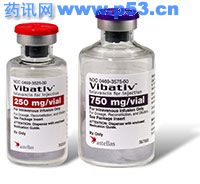制造商:
安斯泰来制药美国公司
药理分类:
抗生素(lipoglycopeptide)
活性成分(补):
特拉万星(以HCl计)为250mg,750mg,每小瓶,密码为重组和稀释后静脉滴注,不含防腐剂。
指示(补):
复杂性皮肤和皮肤结构感染,由于易感克(+)菌。
药理作用:
特拉万星是一种人工合成的万古霉素的衍生物,发挥其通过抑制细菌细胞壁的合成,破坏细胞膜功能的抗菌作用。它已被证明是最有效地打击株金黄色葡萄球菌(包括耐甲氧西林菌株,或葡萄球菌),化脓性链球菌,无乳链球菌,学anginosus组,粪肠球菌(万古霉素敏感菌株只)。
在特拉万星应避免使用患者谁是孕妇,除非对病人的好处大于对胎儿潜在的风险(例如,骨骼畸形)。
临床试验:
特拉万星(10mg/kg的每日)进行了比较万古霉素(1克,每12小时)在两项随机,多国,双盲研究,在成人的MRSA与临床记录复杂性皮肤和皮肤结构感染疑似或确诊为主要病原体。随之而来的病人能接受氨曲南涉嫌克或甲硝唑( - )或厌氧菌感染,分别为。所有处理的效果(ATE)的人口包括所有病人谁收到任何研究药量,并进行疗效评价,临床上可评估(CE)的人口,包括在充分遵守议定书吃掉组的患者。
1794年吃掉患者进行临床评估的1410。每项试验的主要疗效终点是在吃饭,在行政长官访问人群随访临床治愈率。对于在审判和审判1 2事后人群临床治愈率分别为72.5%和74.7%,分别为特拉万星,比71.6%和74.0%,对万古霉素。对于在这两项试验的行政长官人口特拉万星的临床治愈率分别为84.3%和83.9%,分别比为82.8%和87.7%,万古霉素。对于MRSA的临床治愈率为特拉万星率87.0%相比,85.9%,对万古霉素。
法律分类:
接收
成人:
≥18yrs:给由静脉输注60分钟以上。治疗7-14天。肾功能正常:每24小时10mg/kg的。肾功能损害:肌酐清除率30-50mL/min:7.5mg/kg,每24小时; CrCl为10 - <30mL/min:每48小时10mg/kg的;肌酐清除率<10mL/min或透析:不推荐。
儿童:
“18yrs:不推荐。
警告/注意事项:
得到( - )妊娠试验治疗前妇女的生育能力;适当,有效的治疗过程中使用的避孕方法。基线肌酐清除率≤50mL/min。监测肾功能。糖尿病。瑞士法郎。高血压。长QT综合征,无偿心脏衰竭,严重左心室肥厚:不推荐。妊娠(Cat.C):不建议,可能会对胎儿造成伤害。哺乳的母亲。
互动(补):
注意与其他药物可引起QT间期延长。增加与NSAID类药物,ACE抑制剂,利尿剂)肾毒性的危险。可能会干扰凝血试验(例如,铂/印度卢比,聘任,活化凝血时间,凝血的因子Xa测试)和一些尿蛋白测试。
不良反应(补):
味觉障碍,胃肠不适,泡沫尿,肾毒性(重新评估,如果发生),输液反应(“红人综合征”),二重感染(如抗生素相关性结肠炎),QT间期延长。
如何提供:
单用小瓶- 10
最后更新:
2010年1月21日
Manufacturer:
Astellas Pharma US, Inc.
Pharmacological Class:
Antibiotic (lipoglycopeptide)
Active Ingredient(s):
Telavancin (as HCl) 250mg, 750mg; per vial; pwd for IV infusion after reconstitution and dilution; preservative-free.
Indication(s):
Complicated skin and skin structure infections due to susceptible gram (+) bacteria.
Pharmacology:
Telavancin is a synthetic derivative of vancomycin that exerts its antibacterial effect by inhibiting bacterial cell wall synthesis and disrupting the functioning of the cell membrane. It has been shown to be effective against most isolates of Staphylococcus aureus (including methicillin-resistant strains, or MRSA), Streptococcus pyogenes, S. agalactiae, S. anginosus group, E. faecalis (vancomycin-susceptible strains only).
The use of telavancin should be avoided in patients who are pregnant, unless the benefits to the patient outweighs the potential risks to the fetus (eg, skeletal malformations).
Clinical Trials:
Telavancin (10mg/kg daily) was compared to vancomycin (1g every 12 hrs) in two randomized, multinational, double-blind studies in adults with clinically documented complicated skin and skin structure infections with MRSA suspected or confirmed as the primary pathogen. Patients could receive concomitant aztreonam or metronidazole for suspected gram (–) or anaerobic infections, respectively. The all-treated efficacy (ATe) population included all patients who received any amount of study drug and were evaluated for efficacy; the clinically evaluable (CE) population included those patients in the ATe group with sufficient adherence to protocol.
Of 1794 ATe patients, 1410 were clinically evaluable. The primary efficacy endpoint for each trial was the clinical cure rate at a followup visit in the ATe and CE populations. The clinical cure rates for the ATe populations in Trial 1 and Trial 2 were 72.5% and 74.7%, respectively, for telavancin, compared with 71.6% and 74.0% for vancomycin. The clinical cure rates for telavancin in the CE populations for the two trials were 84.3% and 83.9%, respectively, compared with 82.8% and 87.7% for vancomycin. The clinical cure rate for MRSA for telavancin was 87.0% compared to 85.9% for vancomycin.
Legal Classification:
Rx
Adults:
≥18yrs: Give by IV infusion over 60 minutes. Treat for 7–14 days. Normal renal function: 10mg/kg every 24hrs. Renal impairment: CrCl 30–50mL/min: 7.5mg/kg every 24 hrs; CrCl 10 – <30mL/min: 10mg/kg every 48hrs; CrCl<10mL/min or dialysis: not recommended.
Children:
<18yrs: not recommended.
Warnings/Precautions:
Obtain (–) pregnancy test before treatment for women of childbearing potential; use appropriate effective contraception during treatment. Baseline CrCl≤50mL/min. Monitor renal function. Diabetes. CHF. Hypertension. Long QT syndrome, uncompensated heart failure, severe left ventricular hypertrophy: not recommended. Pregnancy (Cat.C): not recommended, may cause fetal harm. Nursing mothers.
Interaction(s):
Caution with other drugs that can cause QT prolongation. Increased risk of renal toxicity with NSAIDs, ACE inhibitors, loop diuretics). May interfere with coagulation tests (eg, PT/INR, aPPT, activated clotting time, coagulation-based factor Xa tests) and some urine protein tests.
Adverse Reaction(s):
Dysgeusia, GI upset, foamy urine; nephrotoxicity (reevaluate if occurs), infusion reactions ("red man syndrome"), superinfection (eg, antibiotic-associated colitis), QT prolongation.
How Supplied:
Single-use vials—10


